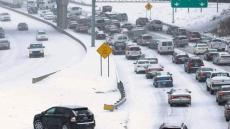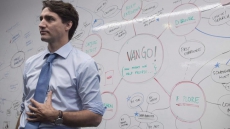More than half the food produced in Canada is wasted and the average kitchen tosses out hundreds of dollars worth of edibles every year, says a study researchers are calling the first of its kind.
"It's a lot of food," said Lori Nikkel of Second Harvest, the Toronto-based group working to reduce food waste that commissioned the study.
"We waste more food than we consume."
The study released Thursday is the world's first to measure food waste using data from industry and other sources instead of estimates, said Martin Gooch of Value Chain Management International, which conducted the study.
Value Chain works with agriculture, aquaculture, marine and food industries to make them more profitable.
"What we did was actually go to industry and (said), 'Give us primary data,'" Gooch said. "This is the first time anywhere in the world that anyone's gone out and got primary data that connects production with consumers."
Results were checked with industry experts.
"At every point in the process, we ground-truthed it," said Gooch. "We're confident our results are conservative."
Previous work has suggested that Canadians waste almost 400 kilograms of food per person, one of the world's highest totals. The new work adds considerable detail to that figure.
Apples rot in the grass for lack of harvest workers. Surplus milk is flushed. Thousands of hectares of produce are plowed after cancelled orders.

The report, funded largely by the Walmart Foundation, concludes 58 per cent of Canadian food production is wasted.
That includes unavoidable waste such as animal bones. But a solid one-third of the waste — more than 11 million tonnes — could be recovered.
The report says the value of usable groceries that wind up in landfills or other disposal sites is almost $50 billion. That's more than half the amount Canadians spend on food every year and is enough to feed every Canadian for five months.
As well, it says avoidable food waste in Canada produces more than 22 million tonnes of climate-changing carbon dioxide emissions.
The report says processing and manufacturing are the largest sources of avoidable waste, accounting for 43 per cent of it. Produce that doesn't meet exacting grading standards, inaccurate market forecasts and inefficient processes are all part of the problem.
So are date codes which remove perfectly healthy food from the market.
"Best-before doesn't mean awful-after," said Nikkel.
Canadian kitchens are also conspicuous wastrels, responsible for 21 per cent of avoidable waste. That's about $1,700 per household in a country in which four million people struggle for regular meals.
Hospitals, restaurants and institutions contribute 13 per cent of avoidable food waste. Retail outlets are close behind at 12 per cent.
Farmers waste only six per cent of the usable food they produce. Distributors waste even less at five per cent.
The report details many ways waste could be cut. Better co-ordination between farmer and processor, changes to crop insurance, clearer date codes, improved safety assessments for donated food and liability reform could all help keep nutrition out of the garbage and on somebody's plate.
Even avoiding bulk buys that result in excess being tossed away would help, said Nikkel.
Canadians should change their attitude toward food, she added.
"We've cheapened it so much that it doesn't have value any more. It would horrify our grandparents.
"We need to go back to that valuing of food."



